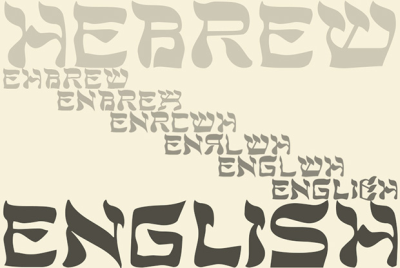The Theory That English Came From Hebrew

By Hezy Laing, Tablet Magazine
December 10, 2013
What if one day, instead of speaking hundreds of different languages, all of humanity suddenly began speaking the exact same language? More incredibly—what if we already do? A new movement called “Edenics” makes the claim that modern day English is simply a derivative of biblical Hebrew.
In fact, the proponents of this theory say that all human languages are simply offshoots of Hebrew and claim to have thousands of examples to back them up.
At first glance, the idea seems preposterous. English and Hebrew sound entirely different and almost every two equivalent meaning words are completely dissimilar.
For example: Dog - Kelev; Cat - Hatul; Chair - Kiseh; House - Bayit.
Besides which, how could a modern European language created over the last millennia have anything to do with an ancient Semitic language from the Middle East, established thousands of years ago? English is a West Germanic language brought to Britain by German invaders some 1,500 years ago.
German in turn comes from Latin, which is an Italic language derived from Greek and Phoenician. These, in turn, belong to what is known as the Indo-European superfamily of languages.
Hebrew, on the other hand, is a West Semitic dialect belonging to the Afro-Asiatic superfamily of languages. In short, English and Hebrew come from two completely different sources.
On the other hand, if tiny little Judaism, a minor Eastern Mediterranean tribal cult in the days of antiquity, was powerful enough to spin off not one, but two major world religions, Christianity and Islam, then who knows? And indeed, a brief investigation of the relevant material seems to demonstrate that dozens if not hundreds of basic Hebrew and English words cited by the Edenicists do indeed seem to share an uncanny resemblance to each other.
According to the Hebrew Bible, all of humanity once spoke a single language, until God confounded their speech to prevent them from building the Tower of Babel. For the past century the linguistics establishment dismissed the idea of a single mother tongue for all peoples as myth and believed that different languages sprouted up independently of each other in different regions of the globe. But over the last two and half decades that has slowly begun to change.
The guru of Edenics and self-declared “founder, chief researcher and editor of the idea” is Isaac E. Mozeson, an American-born lecturer on literature and Judaica who moved to Israel in 2010. “It was a little birdie that whispered the Edenic concept into my ear back in 1978,” Mozeson wrote, describing a time when he was a doctoral student of literature at New York University (he never completed the degree). “I was stuck with a boring linguistics requirement. One day our professor was demonstrating the genius of what he said was the Indo-European root for the generic bird word SPER. Suddenly my mind harkened back to my second-grade Hebrew class when I first learned a similar generic word for bird … TSIPOR.”
This chance event set off in Mozeson a train of thought that would consume him for the next 35 years as he came to believe—and set out to prove—that Hebrew was the root of all languages.
“There are hundreds of English words which have almost the exact same structure as similar-meaning Hebrew words,” he told me during a long interview in his Spartan apartment in downtown Jerusalem."
For instance:
Eye - Ayin;
Twin - Towem;
Tour - Toor;
Fruit - Peyrot;
Evil - Avel;
Cry - Kria;
Lick - Likek;
Piece - Pasis;
Scale - Shakel;
Earth - Aretz;
Wine - Yayin;
Direction - Derech.
"While it’s easy to assume the Hebrew words I just mentioned were inspired by modern English, they’re not. All these Hebrew words are found in the Bible, which means they are over 2,500 years old—far older than English.”



